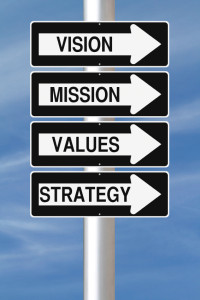 This week I led a webinar for HR That Works called “How to Create an Intentional Culture,” (based on Chapter 2 of Putting Together the Entrepreneurial Puzzle). We did polling questions throughout the webinar with some interesting results. According to this group of HR professionals:
This week I led a webinar for HR That Works called “How to Create an Intentional Culture,” (based on Chapter 2 of Putting Together the Entrepreneurial Puzzle). We did polling questions throughout the webinar with some interesting results. According to this group of HR professionals:
•80% of CEOs play a role in living the companies’ values
•80% of the companies had stated values
•10% of respondents said they had no mission or vision statements
•60% of the respondents who said they had a mission and vision statement said that 50% or less of their staff knew what they were
Intentional Culture starts with values so it was encouraging to see that at least 80% of the companies attending had values that were stated and understood and that the CEOs actually played a role in living those, (a strong demonstration of good leadership). The bad news was that those values were not translating into what the companies’ mission and vision were. Without the next step after identifying values, it’s sort of like a cliffhanger movie – you don’t know how it ends or what you’re supposed to do with it. Unfortunately, when this is the case most of your people end up with degrees from “MSU” (Make Stuff Up).
The problem with this is the values sometimes end up being interpreted differently than was intended, therefore creating an “unintentional culture.” Remember that all companies have a culture, as the leader it’s your job to make sure it’s the one you intended.
Here’s an example of how one CEO leads his company through values and is very “intentional” about the mission and vision. The mission of the company is “We are committed to designing and manufacturing the best positional support systems for every wheelchair user. We make it easily adaptable to individual needs and empower every person to achieve their best.” The values are; Precision, Knowledge, Advocacy, Design and Empowerment.
The office is designed in an open format, encouraging every employee to contribute (empowerment). They are known as the “best” or “experts” in the industry (precision, design, knowledge). They have created standards for the industry and for over 10 years have pushed to get these in place (advocacy and knowledge). All the actions they have taken over the history of the company are very intentional, and they have chosen to take the expert or leader position in the field, versus the low cost providers whose mission is to sell more product. The point is they have become the leader and experts by intentionally “living” these values every single day.
One particular ritual the president has which is a great demonstration of living their values is that every day he makes the rounds to say good morning to all 45 employees. It takes about 10 minutes, but it’s a very valuable use of his time. He is living the values and creating an intentional culture with a 10 minute leadership exercise.
What are you doing to create an intentional culture in your organization? What is one thing you can do to reinforce your values every day? It may only take a few minutes and the payoff will be immense.
